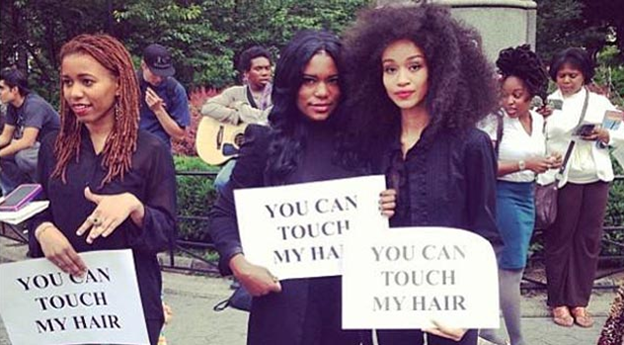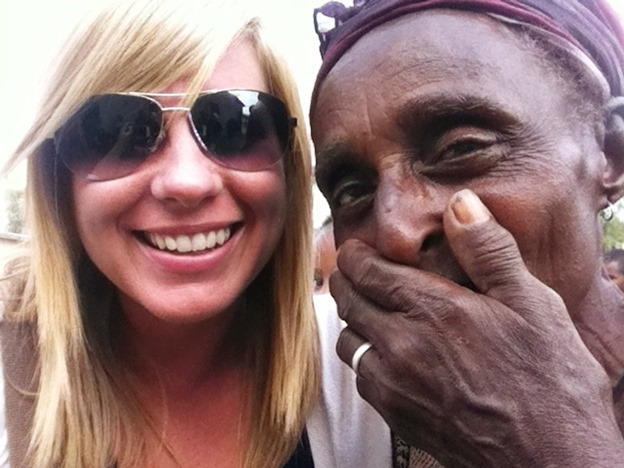There is an interactive public art exhibit today in New York City where observers can “explore the tactile fascination with black hair” by feeling the hair of black women. Un-ruly.com, who organized the event, describes it as a public art exhibit: “where strangers from all walks of life will have the welcomed opportunity to touch various textures of black hair.”  It’s a fascinating social experiment, but I have mixed feelings about it. I know, from my black friends, that unsolicited hair touching is a major issue for black women, especially for those who rock a mane of natural curls. It’s an issue even in diverse places in 2013, and I think in large part it’s due to the fact that, for years, black women have felt the need to “tame” their hair by straightening or braiding or otherwise masking the natural state of their hair. A growing number of black men and women have rejected this practice, favoring styles that work with their natural texture. But because it’s still rare and new, it garners some curiosity, and with it . . . some boundary-crossing as people let their curiosity overcome another person’s personal space. We experience this on occasion with Kembe’s hair, although it was much more pronounced on our visit to Peru, where he was victim to “hair-petting” almost everywhere we went.
It’s a fascinating social experiment, but I have mixed feelings about it. I know, from my black friends, that unsolicited hair touching is a major issue for black women, especially for those who rock a mane of natural curls. It’s an issue even in diverse places in 2013, and I think in large part it’s due to the fact that, for years, black women have felt the need to “tame” their hair by straightening or braiding or otherwise masking the natural state of their hair. A growing number of black men and women have rejected this practice, favoring styles that work with their natural texture. But because it’s still rare and new, it garners some curiosity, and with it . . . some boundary-crossing as people let their curiosity overcome another person’s personal space. We experience this on occasion with Kembe’s hair, although it was much more pronounced on our visit to Peru, where he was victim to “hair-petting” almost everywhere we went.  I know some people think that hair-petting is a sign of latent racism , or some desire by white folks to treat black people as public property. There are plenty of people I respect who view it as such, but I’m not so sure. My travel experience has taught me that hair-petting is an international epidemic. When I was in Ethiopia, my blond mane was suddenly the target. I had scores of Ethiopians touch my hair, from small kids to older women. I didn’t take offense. I think they were curious, and it actually seemed to delight them a little bit. Same thing in Haiti . . . Karis’s white-blond locks had many adults reaching to touch her hair.
I know some people think that hair-petting is a sign of latent racism , or some desire by white folks to treat black people as public property. There are plenty of people I respect who view it as such, but I’m not so sure. My travel experience has taught me that hair-petting is an international epidemic. When I was in Ethiopia, my blond mane was suddenly the target. I had scores of Ethiopians touch my hair, from small kids to older women. I didn’t take offense. I think they were curious, and it actually seemed to delight them a little bit. Same thing in Haiti . . . Karis’s white-blond locks had many adults reaching to touch her hair.  Now hear me say: I think touching someone’s hair without permission is rude. Really rude. But I don’t know if the desire itself is malevolent. I would hope it’s an impulse that is stifled by self-control and common courtesy, but I think that white people’s obsession with black hair in it’s natural state stems from sincere curiosity about difference. I don’t know that curiosity about difference is inherently bad. Still . . . I’m not sure how I feel about a display where women let people touch their hair. On the one hand, I feel cringe-y about it. I would love to know how it feels for the models. On the other hand, perhaps there is some benefit of “going there” . . . of acknowledging the curiosity and letting it be satisfied in a mutually consenting venue. There is a popular meme on Reddit in which black people answer race questions from white people that they’ve always wanted to ask but were afraid to broach, and for the most part I think it’s actually bridging some gaps to have these conversations. Is the hair thing in this vein?
Now hear me say: I think touching someone’s hair without permission is rude. Really rude. But I don’t know if the desire itself is malevolent. I would hope it’s an impulse that is stifled by self-control and common courtesy, but I think that white people’s obsession with black hair in it’s natural state stems from sincere curiosity about difference. I don’t know that curiosity about difference is inherently bad. Still . . . I’m not sure how I feel about a display where women let people touch their hair. On the one hand, I feel cringe-y about it. I would love to know how it feels for the models. On the other hand, perhaps there is some benefit of “going there” . . . of acknowledging the curiosity and letting it be satisfied in a mutually consenting venue. There is a popular meme on Reddit in which black people answer race questions from white people that they’ve always wanted to ask but were afraid to broach, and for the most part I think it’s actually bridging some gaps to have these conversations. Is the hair thing in this vein?  What do you think of the “You Can Touch My Hair” exhibit?
What do you think of the “You Can Touch My Hair” exhibit?

Rage Against the Minivan sometimes earns revenue through sponsored posts, which are clearly labeled, and occasional affiliate links to recommended products. I only feature products that I truly like, and my opinions are always my own.